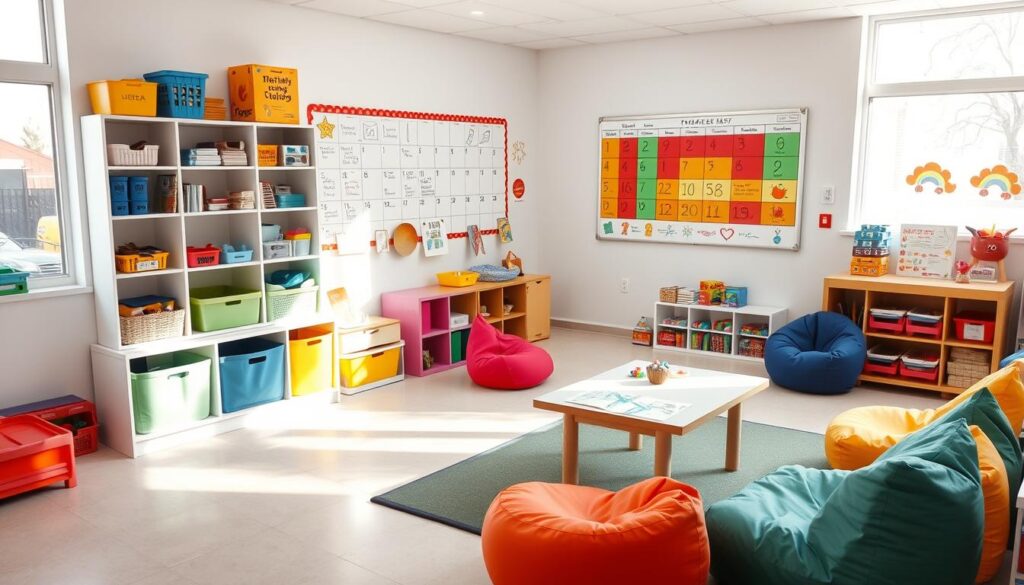If you’re a school-based therapist, you know how hard it is to manage a big caseload. This guide will help you work smarter, not harder. You’ll learn how to organize your time better and give your students the best care possible.
This article will show you how to schedule students well, focus on the most important therapy sessions, and get ready for IEP meetings fast. You’ll also learn how to work better with your school team. Plus, you’ll find out about organizing your caseload, keeping good records, and using technology to help you do your job better.
With the tips from this guide, you’ll be able to handle your caseload with ease. Your students will get the care they need, and you’ll have a better work-life balance.
Key Takeaways
- Develop efficient student scheduling and time management techniques to maximize productivity.
- Learn how to prioritize therapy sessions and prepare for IEP meetings effectively.
- Discover practical caseload organization strategies to streamline your workflow.
- Explore methods for balancing your workload and managing stress as a school therapist.
- Leverage technology and software tools to enhance your caseload documentation and management.
Streamlining Student Scheduling and Time Management
Managing your caseload starts with better scheduling and time use. As a school-based therapist, getting good at these skills is key. It helps you give top-notch care to each student on your caseload.
Prioritizing Therapy Sessions
To put your therapy sessions first, try these tips:
- Sort students by need and urgency. This way, the most urgent cases get seen right away.
- Use a flexible schedule. This lets you adjust plans for emergencies or last-minute changes.
- Talk ahead of time with teachers and admins. This helps avoid scheduling problems and makes rescheduling smoother.
Efficient IEP Meeting Preparation
Getting ready for IEP meetings can take a lot of time. But, with smart planning, you can make it easier:
- Keep student records current and complete. This way, you have all the info you need quickly.
- Work with teachers and parents early. This helps make sure everyone agrees and is ready.
- Use a set template or checklist. It helps you stay organized and make sure you don’t miss anything important.
By using these student scheduling tips and time management strategies, you can improve your therapy sessions and IEP meeting prep. This lets you focus on giving the best care to your students.
“Effective time management is not about doing more, but about doing what matters most.”
Caseload Organization Strategies for Therapists
Organizing your caseload is key to keeping control and providing consistent therapy. Learn strategies to streamline your work, track student progress, and deliver services smoothly. This part covers how to manage your caseload, keep records, and handle your duties as a school therapist.
Start by sorting your caseload by student needs, goals, or service types. This makes planning and running therapy sessions easier. Use a spreadsheet or color codes to organize and access your caseload quickly.
Time management is also vital. Focus on sessions based on student needs, IEPs, and schedules. Use calendars and to-do lists to manage your tasks and avoid missing any student.
| Caseload Organization Strategies | Benefits |
|---|---|
| Categorize caseload by student needs, treatment goals, or service delivery models | Improves efficiency in planning and executing therapy sessions |
| Prioritize therapy sessions based on student needs, IEP requirements, and scheduling constraints | Ensures that no student is overlooked and that therapy is delivered effectively |
| Utilize tools like calendars and to-do lists for time management | Keeps therapists organized and on top of their responsibilities |
By using these strategies, school therapists can make their work flow better, save time, and offer top-notch therapy to students. Keeping your caseload organized is crucial for managing school therapy caseloads and the success of your program.
“Effective caseload organization is the foundation of a successful school therapy program. It enables us to focus on what truly matters – the well-being and progress of our students.”
Balancing Workload and Managing Stress
As a school-based therapist, finding a balance between work and personal life is key. Managing stress and working well with school staff are vital. These steps help keep your job healthy and productive.
Collaboration with School Staff
Building strong relationships with teachers and other staff is crucial. It helps you give your best to your students. Working together means you can share tasks and improve care.
- Regularly meet with teachers to discuss student progress and coordinate intervention strategies.
- Collaborate with administrators to streamline administrative tasks and identify opportunities for efficiency.
- Engage with school counselors, social workers, and other support staff to address the holistic needs of your students.
When everyone works together, managing your workload gets easier. You can then focus on teamwork and achieving great results for your students.

“Collaboration is the key to success in school-based therapy. By working closely with the entire school team, we can achieve remarkable outcomes for our students.”
– Jane Doe, Occupational Therapist
Managing School Therapy Caseloads and Caseload Tips
As school-based therapists, managing our caseloads is a big challenge. We have to prioritize therapy sessions and prepare for IEP meetings. It’s easy to feel overwhelmed. But, with the right strategies, we can manage our time better and give each student the care they need.
One important thing is prioritizing therapy sessions. We need to look at each student’s needs and focus on those who need us most. Keeping a clear schedule helps us make sure every student gets the attention they deserve.
Preparing for IEP meetings is also key. It can take a lot of time, but using technology can help. Tools and templates can make creating IEP documents easier and more accurate.
Organizing our caseloads is another big help. Having a system for tracking student records and therapy materials keeps us on track. It ensures we provide consistent care to all our students.

We’re not alone in this work. Collaboration with other school staff is crucial. Working together with teachers and administrators helps us manage our caseloads better and achieve the best results for our students.
By using these strategies, we can make our work more efficient. We can keep accurate records and give each student the care they need. With a bit of organization and a lot of commitment, we can excel in this field and truly make a difference in the lives of our students.
Caseload Documentation Best Practices
Keeping accurate and detailed records is key to managing a caseload well. School-based therapists need to track student progress and follow rules closely. This ensures they provide top-notch care.
Leveraging Technology and Software Tools
Today, technology and software make documenting easier. Caseload management software helps therapists manage student records and write reports quickly. It saves time and makes important info easy to find.
- Use electronic systems to track student progress and treatment plans.
- Look for software with features like scheduling, billing, and tracking.
- Try technology for assessments and data collection to get precise student data.
Using technology and caseload documentation best practices helps therapists work more efficiently. They can spend more time on personalized care for their students.
“Effective caseload management starts with meticulous documentation. The right tools and strategies can transform the way we track student progress and ensure regulatory compliance.”
Inhealth Staffing: A Partner in Caseload Management
As a school-based therapist, managing your caseload can be tough. You might face ups and downs in your workload or need help with specialized skills. Inhealth Staffing is here to help. They offer temporary or permanent staffing solutions to keep your students’ therapy consistent and top-notch.
Inhealth Staffing’s team gets the school environment’s unique needs. They work with you to figure out what you need. This could be temporary help or long-term support. Their big network of therapists means they can find the right person for your school fast, keeping therapy on track for your students.
Working with Inhealth Staffing lets you focus on giving your students the best care. They handle the staffing logistics. Their dedication to quality and understanding of schools make them a key partner in managing your caseload. This ensures your students get the ongoing support they need.
FAQ
How can I effectively manage my school therapy caseload?
What are some practical tips for prioritizing therapy sessions?
How can I prepare for IEP meetings more efficiently?
What are effective caseload organization strategies for therapists?
How can I balance my workload and manage stress as a school-based therapist?
What are the best practices for caseload documentation?
How can Inhealth Staffing help me manage my school therapy caseload?




